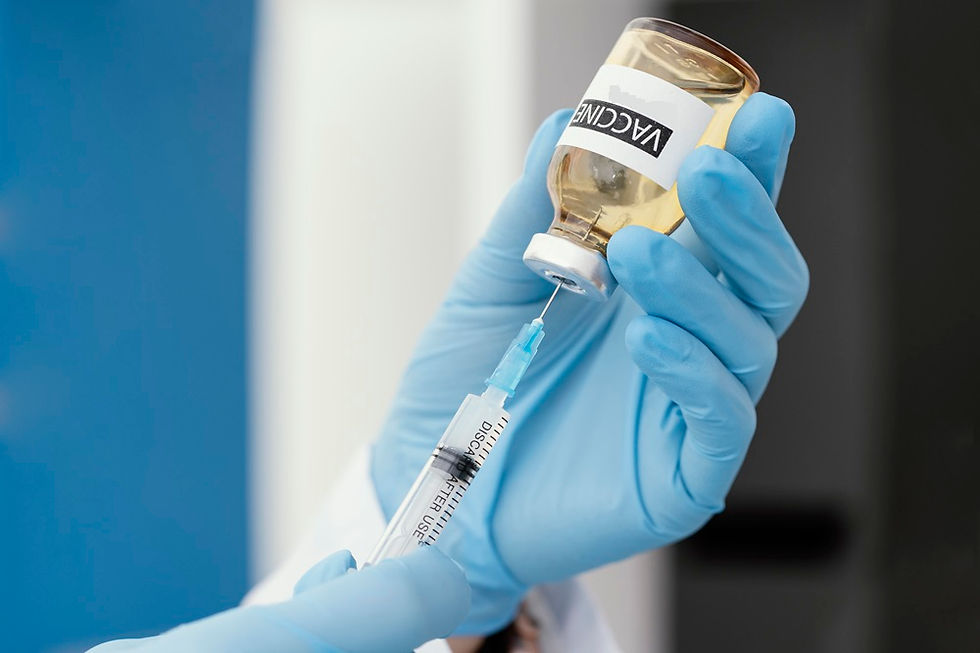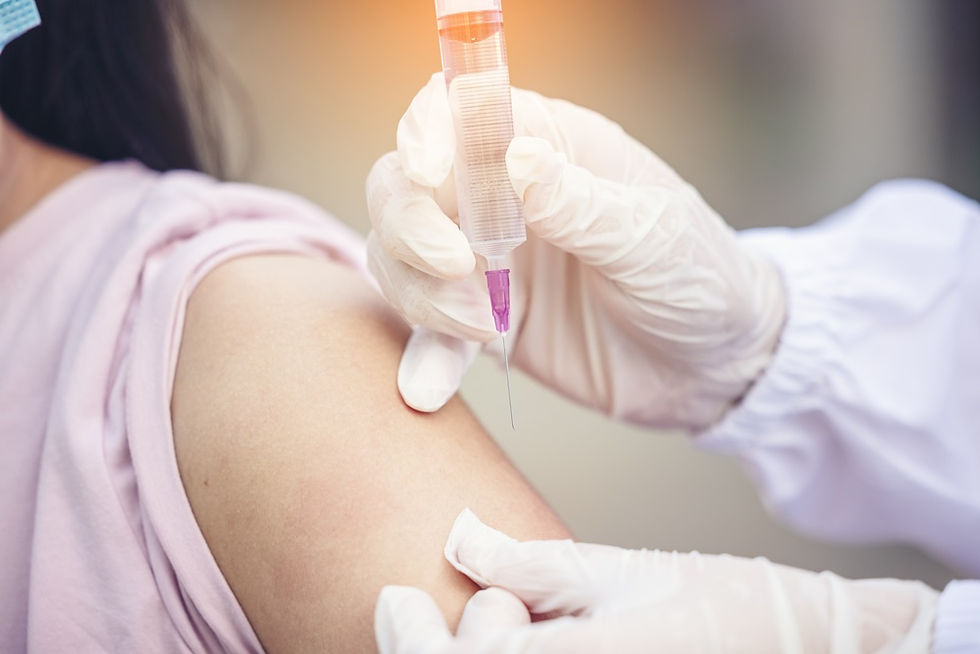Talking to Kids About MMR Shots: What Really Works
- The Sun Rise Post
- Sep 9, 2025
- 5 min read

Getting your child ready for their mmr vaccine doesn't have to be a battle. Most parents worry about how their kids will react, but the right approach can turn a scary experience into a manageable one.
You can help your child feel prepared and confident with simple communication techniques that actually work.
Making Sense of Your Child's Age and Understanding
Your 3-year-old processes information completely differently than your 10-year-old.
Research from the American Academy of Pediatrics shows that children's cognitive development directly affects how they understand medical procedures.
Toddlers (2-4 years) think in concrete terms. They can't grasp future consequences or abstract concepts like "preventing disease." What they do understand is immediate comfort and trust.
School-age children (5-11 years) start developing logical thinking. They can understand cause and effect but still need simple explanations. Studies indicate that children this age respond better to honest, straightforward information rather than overly detailed medical explanations.
Preteens and teens (12+ years) can handle more complex information. They appreciate being treated as capable individuals who can understand the reasoning behind medical decisions.
What Happens During MMR Vaccination?
You need to know the facts before you can explain them to your child. The MMR vaccine protects against measles, mumps, and rubella - three diseases that can cause serious complications.
Disease | Potential Complications | Vaccine Effectiveness |
Measles | Brain damage, hearing loss, death | 97% effective after 2 doses |
Mumps | Meningitis, hearing loss, fertility issues | 88% effective after 2 doses |
Rubella | Birth defects if contracted during pregnancy | 97% effective after 2 doses |
The shot itself takes seconds. Most children experience mild soreness at the injection site, and about 15% develop a mild fever within 7-12 days. These reactions are normal signs that the immune system is responding properly.
Age-Specific Communication Approaches
For Toddlers: Keep it simple and immediate. Say "The doctor will give you medicine to keep you healthy. It might pinch for just a second, then we're done." Don't explain the shot days in advance - their sense of time isn't developed enough, and they'll just worry longer.
For School-Age Kids: Give them a few days' notice with basic facts. "You're going to get a shot that protects you from getting very sick. Your arm might be sore afterward, like after you play hard at the playground." Let them ask questions, but don't overwhelm them with medical details.
For Preteens and Teens: Include them in the conversation about health decisions. Explain how vaccines work and why they're important for community health. "This vaccine helps your body learn to fight off three diseases. Most people feel fine afterward, but you might have a sore arm."
Managing Pre-Visit Anxiety
Timing matters when you tell your child about the upcoming vaccination. Research from Johns Hopkins shows that optimal timing varies by age - toddlers do best with same-day information, while older children benefit from 2-3 days' notice.
Create a comfort plan together. Let your child choose a special toy or stuffed animal to bring. Some children feel more confident when they understand exactly what will happen. Others prefer minimal details and maximum comfort.
Practice deep breathing together. Teach your child to breathe in slowly through their nose and out through their mouth. This simple technique activates the parasympathetic nervous system, naturally reducing anxiety.
During the Vaccination Visit
Your behavior directly influences your child's experience. Children pick up on parental anxiety faster than you might think. Stay calm and confident, even if you're feeling nervous inside.
Position matters for comfort and restraint. Most healthcare providers recommend having younger children sit on your lap facing outward.
This gives them security while allowing the provider clear access to their arm.
Distraction techniques that work:
Singing a favorite song together
Counting to ten slowly
Looking at pictures on your phone
Squeezing a stress ball or fidget toy
Talking about weekend plans
Don't say "it won't hurt" because it might, and children will lose trust in your honesty. Instead, acknowledge that it might pinch but emphasize how quickly it's over.
After the Shot Care and Communication
Praise your child's bravery immediately. Be specific: "You did such a good job staying still" or "I'm proud of how you took deep breaths."
Watch for normal reactions over the next few days. About 5-15% of children develop a mild fever 7-12 days after the MMR vaccination.
This delayed reaction often surprises parents, but it's completely normal and indicates the vaccine is working.
Normal Reactions | When They Occur | What to Do |
Sore arm | Within 24 hours | Apply cool compress, gentle movement |
Mild fever | 7-12 days later | Monitor temperature, ensure hydration |
Faint rash | 7-12 days later | Normal immune response, no treatment needed |
Address any concerns your child has honestly. If they ask why they need shots, explain that it's one way we take care of our bodies, just like eating good food and getting enough sleep.

Building Long-Term Trust
Your approach to this vaccination sets the stage for future medical experiences.
Children who feel heard and supported during medical procedures develop better relationships with healthcare throughout their lives.
Follow through on any promises you make. If you say you'll get ice cream afterward, make sure you do. These small actions build trust that makes future medical visits easier.
Remember that every child responds differently. Some bounce back immediately, while others need extra comfort.
Both reactions are normal, and neither reflects on your parenting or your child's character.
Frequently Asked Questions
How should I explain the MMR vaccine to my toddler?
Answer: Keep it very simple and immediate. Tell them: “The doctor will give you medicine to keep you healthy. It might pinch for just a second, then it’s all done.” Avoid bringing it up days in advance, since toddlers don’t understand time well and may just worry longer.
How much detail should I give my school-age child about the vaccine?
Answer: Give them a few days’ notice and stick to basic facts. For example: “You’re going to get a shot that helps keep you from getting very sick. Your arm might be a little sore after, like when you play hard.” Let them ask questions, but don’t overload them with medical jargon.
What’s the best way to talk to preteens and teens about vaccines?
Answer: Treat them as capable decision-makers. Explain how vaccines work, why they protect both them and the community, and what side effects they might expect. They usually appreciate being included in the conversation.
How can I help my child manage anxiety before their shot?
Answer: Timing matters. Toddlers do best with same-day notice, while older kids benefit from 2–3 days’ preparation. Comfort items (a stuffed toy, favorite blanket), deep breathing exercises, and choosing a distraction method (like music, counting, or looking at pictures) all help reduce anxiety.
What can I do during the vaccination to make it easier?
Answer: Stay calm, because kids pick up on your emotions. For toddlers, sitting on your lap facing outward provides comfort while giving the nurse easy access. Use distraction (songs, counting, talking about weekend plans) instead of saying “it won’t hurt.”
What side effects are normal after the MMR vaccine?
Answer: Common reactions include a sore arm within 24 hours, a mild fever about 7–12 days later, and sometimes a faint rash in the same timeframe. These are normal signs that the immune system is responding.
How should I care for my child after the MMR shot?
Answer: For soreness, use a cool compress and gentle arm movement. For fever, encourage hydration and monitor their temperature. A mild rash needs no treatment. Always praise your child’s bravery to reinforce a positive medical experience.
Why does the MMR vaccine matter?
Answer: It protects against three serious diseases: measles (can cause brain damage, hearing loss, or death), mumps (linked to meningitis and fertility issues), and rubella (can cause birth defects if caught during pregnancy). Two doses are highly effective — about 97% for measles and rubella, and 88% for mumps.
How can I build long-term trust with my child around medical visits?
Answer: Be honest about what to expect, follow through on promises (like a treat afterward), and validate their feelings. Children who feel supported during shots are more likely to develop a positive relationship with healthcare in the future.



Comments